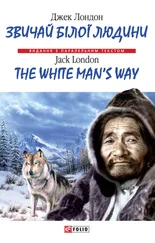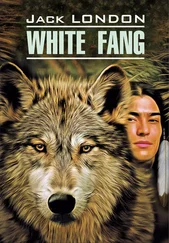Jack London - White Fang
Здесь есть возможность читать онлайн «Jack London - White Fang» весь текст электронной книги совершенно бесплатно (целиком полную версию без сокращений). В некоторых случаях можно слушать аудио, скачать через торрент в формате fb2 и присутствует краткое содержание. Жанр: Классическая проза, на английском языке. Описание произведения, (предисловие) а так же отзывы посетителей доступны на портале библиотеки ЛибКат.
- Название:White Fang
- Автор:
- Жанр:
- Год:неизвестен
- ISBN:нет данных
- Рейтинг книги:5 / 5. Голосов: 1
-
Избранное:Добавить в избранное
- Отзывы:
-
Ваша оценка:
- 100
- 1
- 2
- 3
- 4
- 5
White Fang: краткое содержание, описание и аннотация
Предлагаем к чтению аннотацию, описание, краткое содержание или предисловие (зависит от того, что написал сам автор книги «White Fang»). Если вы не нашли необходимую информацию о книге — напишите в комментариях, мы постараемся отыскать её.
White Fang — читать онлайн бесплатно полную книгу (весь текст) целиком
Ниже представлен текст книги, разбитый по страницам. Система сохранения места последней прочитанной страницы, позволяет с удобством читать онлайн бесплатно книгу «White Fang», без необходимости каждый раз заново искать на чём Вы остановились. Поставьте закладку, и сможете в любой момент перейти на страницу, на которой закончили чтение.
Интервал:
Закладка:
But Beauty Smith had a purpose in all that he did to White Fang. One day a number of men gathered about the pen. Beauty Smith entered, club in hand, and took the chain off from White Fang's neck. When his master had gone out, White Fang turned loose and tore around the pen, trying to get at the men outside. He was magnificently terrible. Fully five feet in length, and standing two and one-half feet at the shoulder, he far outweighed a wolf of corresponding size. From his mother he had inherited the heavier proportions of the dog, so that he weighed, without any fat and without an ounce of superfluous flesh, over ninety pounds. It was all muscle, bone, and sinew-fighting flesh in the finest condition.
The door of the pen was being opened again. White Fang paused. Something unusual was happening. He waited. The door was opened wider. Then a huge dog was thrust inside, and the door was slammed shut behind him. White Fang had never seen such a dog (it was a mastiff); but the size and fierce aspect of the intruder did not deter him. Here was some thing, not wood nor iron, upon which to wreak his hate. He leaped in with a flash of fangs that ripped down the side of the mastiff's neck. The mastiff shook his head, growled hoarsely, and plunged at White Fang. But White Fang was here, there, and everywhere, always evading and eluding, and always leaping in and slashing with his fangs and leaping out again in time to escape punishment.
The men outside shouted and applauded, while Beauty Smith, in an ecstasy of delight, gloated over the rippling and manging performed by White Fang. There was no hope for the mastiff from the first. He was too ponderous and slow. In the end, while Beauty Smith beat White Fang back with a club, the mastiff was dragged out by its owner. Then there was a payment of bets, and money clinked in Beauty Smith's hand.
White Fang came to look forward eagerly to the gathering of the men around his pen. It meant a fight; and this was the only way that was now vouchsafed him of expressing the life that was in him. Tormented, incited to hate, he was kept a prisoner so that there was no way of satisfying that hate except at the times his master saw fit to put another dog against him. Beauty Smith had estimated his powers well, for he was invariably the victor. One day, three dogs were turned in upon him in succession. Another day a full– grown wolf, fresh-caught from the Wild, was shoved in through the door of the pen. And on still another day two dogs were set against him at the same time. This was his severest fight, and though in the end he killed them both he was himself half killed in doing it.
In the fall of the year, when the first snows were falling and mush-ice was running in the river, Beauty Smith took passage for himself and White Fang on a steamboat bound up the Yukon to Dawson. White Fang had now achieved a reputation in the land. As «the Fighting Wolf» he was known far and wide, and the cage in which he was kept on the steam-boat's deck was usually surrounded by curious men. He raged and snarled at them, or lay quietly and studied them with cold hatred. Why should he not hate them? He never asked himself the question. He knew only hate and lost himself in the passion of it. Life had become a hell to him. He had not been made for the close confinement wild beasts endure at the hands of men. And yet it was in precisely this way that he was treated. Men stared at him, poked sticks between the bars to make him snarl, and then laughed at him.
They were his environment, these men, and they were moulding the clay of him into a more ferocious thing than had been intended by Nature. Nevertheless, Nature had given him plasticity. Where many another animal would have died or had its spirit broken, he adjusted himself and lived, and at no expense of the spirit. Possibly Beauty Smith, arch-fiend and tormentor, was capable of breaking White Fang's spirit, but as yet there were no signs of his succeeding.
If Beauty Smith had in him a devil, White Fang had another; and the two of them raged against each other unceasingly. In the days before, White Fang had had the wisdom to cower down and submit to a man with a club in his hand; but this wisdom now left him. The mere sight of Beauty Smith was sufficient to send him into transports of fury. And when they came to close quarters, and he had been beaten back by the club, he went on growling and snarling, and showing his fangs. The last growl could never be extracted from him. No matter how terribly he was beaten, he had always another growl; and when Beauty Smith gave up and withdrew, the defiant growl followed after him, or White Fang sprang at the bars of the cage bellowing his hatred.
When the steamboat arrived at Dawson, White Fang went ashore. But he still lived a public life, in a cage, surrounded by curious men. He was exhibited as «the Fighting Wolf,» and men paid fifty cents in gold dust to see him. He was given no rest. Did he lie down to sleep, he was stirred up by a sharp stick-so that the audience might get its money's worth. In order to make the exhibition interesting, he was kept in a rage most of the time. But worse than all this, was the atmosphere in which he lived. He was regarded as the most fearful of wild beasts, and this was borne in to him through the bars of the cage. Every word, every cautious action, on the part of the men, impressed upon him his own terrible ferocity. It was so much added fuel to the flame of his fierceness. There could be but one result, and that was that his ferocity fed upon itself and increased. It was another instance of the plasticity of his clay, of his capacity for being moulded by the pressure of environment.
In addition to being exhibited he was a professional fighting animal. At irregular intervals, whenever a fight could be arranged, he was taken out of his cage and led off into the woods a few miles from town. Usually this occurred at night, so as to avoid interference from the mounted police of the Territory. After a few hours of waiting, when daylight had come, the audience and the dog with which he was to fight arrived. In this manner it came about that he fought all sizes and breeds of dogs. It was a savage land, the men were savage, and the fights were usually to the death.
Since White Fang continued to fight, it is obvious that it was the other dogs that died. He never knew defeat. His early training, when he fought with Lip-lip and the whole puppy-pack, stood him in good stead. There was the tenacity with which he clung to the earth. No dog could make him lose his footing. This was the favourite trick of the wolf breeds-to rush in upon him, either directly or with an unexpected swerve, in the hope of striking his shoulder and overthrowing him. Mackenzie hounds, Eskimo and Labrador dogs, huskies and Malemutes-all tried it on him, and all failed. He was never known to lose his footing. Men told this to one another, and looked each time to see it happen; but White Fang always disappointed them.
Then there was his lightning quickness. It gave him a tremendous advantage over his antagonists. No matter what their fighting experience, they had never encountered a dog that moved so swiftly as he. Also to be reckoned with, was the immediateness of his attack. The average dog was accustomed to the preliminaries of snarling and bristling and growling, and the average dog was knocked off his feet and finished before he had begun to fight or recovered from his surprise. So often did this happen, that it became the custom to hold White Fang until the other dog went through its preliminaries, was good and ready, and even made the first attack.
But greatest of all the advantages in White Fang's favour, was his experience. He knew more about fighting than did any of the dogs that faced him. He had fought more fights, knew how to meet more tricks and methods, and had more tricks himself, while his own method was scarcely to be improved upon.
Читать дальшеИнтервал:
Закладка:
Похожие книги на «White Fang»
Представляем Вашему вниманию похожие книги на «White Fang» списком для выбора. Мы отобрали схожую по названию и смыслу литературу в надежде предоставить читателям больше вариантов отыскать новые, интересные, ещё непрочитанные произведения.
Обсуждение, отзывы о книге «White Fang» и просто собственные мнения читателей. Оставьте ваши комментарии, напишите, что Вы думаете о произведении, его смысле или главных героях. Укажите что конкретно понравилось, а что нет, и почему Вы так считаете.












